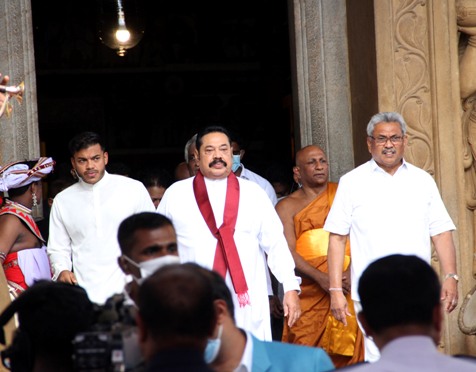Of burials and birthdays
Are Rajapaksas moving towards rapprochement with the Muslims?
By P. K. Balachandran
COLOMBO – The ruling party Sri Lanka Podujana Permuna (SLPP) led by the Rajapaksa brothers appears to be moving towards a rapprochement with the alienated Muslim minority.
After winning the November 2019 Presidential election decisively and the August 2020 parliamentary elections with a two-thirds majority without the support of the Muslim and Tamil minorities, the SLPP felt it could co-opt Muslims without loss of political credibility among its Sinhalese-Buddhist vote bank.
According to SLPP insiders, the decision to seek and secure support for the 20th Amendment from Muslims MPs elected on the opposition Samagi Jana Balawegaya (SJB) ticket stemmed from the confidence that the SLPP’s core Sinhala-Buddhist constituency would not view it as a sign of weakness but as a sign of confidence. In the event, six of the eight cross voters from the opposition were Muslims.
That the Rajapaksa’s supremacy and power in the SLPP and the government was real was also established when the rebels in the ruling camp, including the vociferous and ultra-nationalistic Wimal Weerawansa, finally fell in line without a whimper and voted for the 20A. That the leadership of the Muslim parties from which the cross voters came were silent about the cross voting testified either to the power of the Rajapaksas or to a secret willingness on their part to begin cooperating with the government and the ruling party.
After getting the 20A passed with more than the minimum votes required, the Rajapaksas greeted the Muslims on the Prophet’s birthday. The wording of the messages from the President and the Prime Minister that they highly respect the Prophet’s call for peace and brotherhood among different communities.
President Gotabaya Rajapaksa said in his message that giving priority to religious beliefs at a time of distress like the one brought about by the pandemic, would bring solace to the mind. “We must socialize the virtues learnt from the character of the Prophet to achieve mutual prosperity, reconciliation among different ethnic groups and the common good,” he said.
Prime Minister Mahinda Rajapaksa said Prophet Muhammad was committed to building a respectable society full of humanity. “The qualities he practiced throughout his life, the sacrifices he made for humanity are infinite. Mutual understanding, brotherhood, helping one another and fairness are the basic teachings of Prophet Muhammad. Similarly, his vision was to fill human society with good qualities, knowledge and non-violence,” he said.
Significantly, Mahinda added: “Islamic countries have always supported Sri Lanka unconditionally in international organizations. I would like to express my gratitude for the international support given to us.
“Also, we have faced an era of severe health due to COVID-19. Hence I request you to celebrate this great day by following proper health instructions according to Islamic guidelines.”
The use of the expression “according to Islamic guidelines” appears to be significant because within days the government came out with an announcement that it has appointed a committee to meet this week to reconsider a decision taken in March that had made cremation mandatory for disposing the bodies of those who succumb to the novel coronavirus.
Health Minister Pavitra Wanniarachchi told Parliament on Tuesday (3) that the decision to allow only cremation was based on the advice of medical experts who gave the government a scientific analysis of the situation at the time. “In March, it was an unknown virus. There was a need to study it further. Therefore, a committee appointed in this regard would meet this week to reconsider this decision,” she said.
Opposition Leader Sajith Premadasa said the government could have done so earlier instead of communalizing the issue of cremation and making the Muslims, who insist on burial as per their faith, feel bad.
“Eminent persons in the medical field such as Professors Rizvi Sheriff, Vajra H.W. Dissanayake, Ruvaiz Haniffa and Ravindra Fernando were among those who called for an independent committee to look into this matter and give a decision but that was not taken into account,” he charged.
Chief Opposition Whip Lakshman Kiriella said WHO guidelines did not favour cremation over burial, as Colombo District MP Mujibur Rahman said nine Muslims who succumbed to COVID-19 had been cremated so far and urged the government to do away with the mandatory cremation regulations. “This is a psychological issue and not a political one,” he said.
SLPP sources said many well-known Muslims had been campaigning quietly to getting the ban on burial rescinded and Justice Minister Ali Sabry was liaising with them and being a conduit between them and President Gotabaya.
The nature of the water table in Sri Lanka is an issue which has to be considered while making a decision, and at any rate, any change in the policy will have to be based on a scientific study. The final recommendation will have to appeal to the rational mind, an SLPP source said. “Only then will the majority community, which is scared of the spread of COVID-19, will be able to accept burial without fear or reservation.”
The expectation is that the committee will sanction burial. “It is noteworthy that burial had been allowed in every country hit by COVID-19 except Sri Lanka and China,” the source pointed out.
If, indeed burial is allowed eventually, it will help smoothen the rough edges in the relationship between the Rajapaksas and the Muslims to some extent. But not all Muslims are likely to fall in line because the chasm between the community and the Rajapaksas is both wide and deep.
The 2014 riots in Aluthgama, the various anti-Muslim campaigns of the government-backed Bodu Bala Sena and the April 21, 2019 suicide bombings by Islamic terrorists had led to communal alienation of a high order which will take long to end.
-P K. Balachandran is a senior Colombo-based journalist who in the past two decades, has reported for The Hindustan Times, The New Indian Express and the Economist


